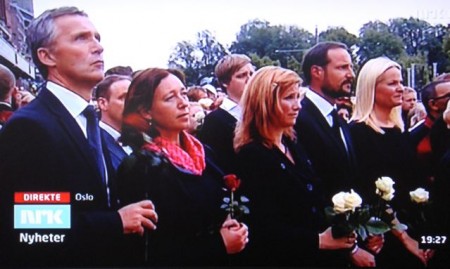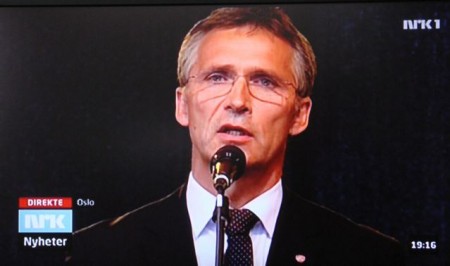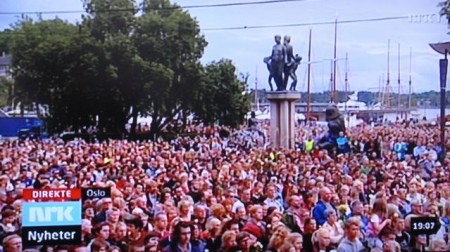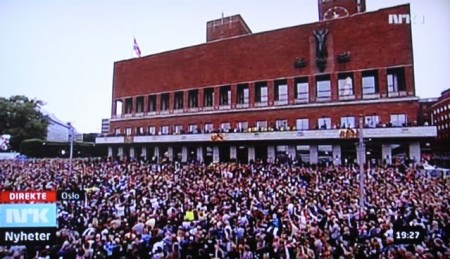Prime Minister Jens Stoltenberg received a hero’s welcome when he walked on stage at Monday’s huge and historic memorial service in front of Oslo’s City Hall. An estimated 150,000 Norwegians had gathered and the roar from the crowd seemed to startle even the veteran politician and Labour Party leader himself, who has led Norway’s government for the past six years.

Stoltenberg, his voice cracking at times with emotion, has been working almost around the clock since a powerful bomb exploded in the heart of Norway’s government complex on Friday afternoon. He has all reason to be utterly exhausted, both physically and emotionally. Stoltenberg’s own office atop the lone high-rise in the complex built from 1958 to 1996 was heavily damaged in the blast, so he’s lost his base of operations along with untold personal and professional possessions. Like 2,000 others working in the government ministries, he faces having to keep doing his job under provisional and uncertain circumstances.
Worst of all is the personal grief Stoltenberg has faced since the actions of a lone bomber and gunman left more than 70 persons dead. Many of them were Labour Party colleagues, young, ambitious members of the next generation, and it was the party Stoltenberg has led for the past decade that was the terror defendant’s target. It’s been, in short, a terrible few days.

But through it all, Stoltenberg has remained poised, compassion-ate, non-confronta-tional and even well-groomed as he took control of the crisis and quickly sought to reassure nearly 5 million shocked Norwegians and his own government colleagues. In countless live and televised appearances since the bomb went off downtown and the shooting started on the island of Utøya, he has been informative and authoritative but in his typically genial and non-formal style. Most of all, he has resisted what may have been a natural instinct to lose his temper and seek revenge.
“I’m powerfully impressed,” Kjell Lars Berge, a professor specializing in rhetoric at the University of Oslo, told Norwegian Broadcasting (NRK) on Tuesday. “I was, like many others, afraid over what these attacks could bring in terms of conflict-oriented behaviour. Instead, Stoltenberg has been calm, conciliatory and unifying.
“He has refrained from using hateful rhetoric and instead has stressed solidarity and fellowship,” said Berge, who also thinks Oslo Mayor Fabian Stang of the opposition Conservative Party and Crown Prince Haakon have shown strong and calm leadership in a time of crisis. But it’s Stoltenberg who clearly has made the biggest impression, and spoken in simple, clear and firm statements.

At Monday’s enormous gathering in Oslo of Norwegians seeking solace and showing solidarity, Stoltenberg repeated that “we won’t let fear break us” and urged Norwegians to respond to the tragedy not with hate or vengeance but with new inspiration to get involved in their communities, to use their right to vote, “to participate in our democracy.”
He called the massacre at the summer camp “an attack on young Norwegians’ dreams for a better world” but suggested the dreams needn’t be shattered. “You can still make a difference,” he said, reminding the crowd that they all need to work together “to form Norway after July 22, 2011,” urging that the principles of an open, democratic society must prevail.

Stoltenberg’s government, it seems, will not respond to the tragedy by imposing measures that would dramatically change Norway’s open society with accessible leaders. It’s unlikely he will add to the bureaucracy with the equivalent of the US’ Department of Homeland Security, or introduce strict new security measures that would distance he and other government leaders from the constituency. And he won’t be declaring war on anyone or any groups.
On a more personal note, and fighting back tears, Stoltenberg sent another message as well, “to those who have lost loved ones: We are here tonight for you.” He wanted them to know that the nation sends its sympathy and mourns with them, and that he, like others who organized the grassroots memorials in Oslo and elsewhere around the country, was gratified that so many turned out for the event.

The crowd repeatedly waved the roses they were holding and Stoltenberg was rewarded with long, sustained applause, the kind that Norwegians normally use when they want an encore at a concert. They wanted more from Stoltenberg, but he moved off the stage to give the spotlight to the next speaker, the head of Labour’s youth group who survived the massacre and likely has a successful political career ahead since his message was much the same.
“The prime minister has managed to make folks feel secure by gripping the moment and conducting himself in a very adult manner,” Professor Berge told NRK. “He has handled this all in an almost unreal, beautiful way.”
Berge isn’t alone in his analysis. He’s heard from colleagues around the world who are fascinated by Stoltenberg’s non-confrontational approach and what some are calling “a great rhetorical event.”
Foreign media including Der Spiegel in Germany and the Irish Times have written that Stoltenberg and the Norwegians have redefined political courage, not with the sort of macho expressions used in the US after 9/11 but with dignity. And no one is swearing to take revenge, least of all their leader.
Views and News from Norway/Nina Berglund
Join our Readers’ Forum or comment below.
To support our news service, please click the “Donate” button now.

